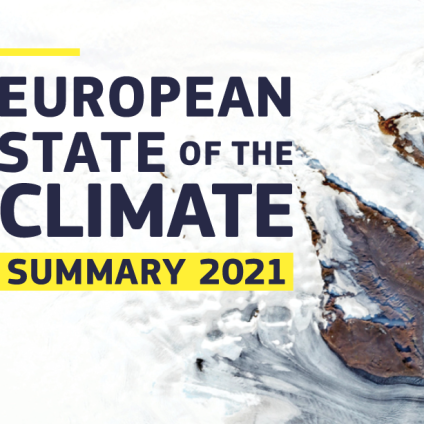In the annual report on the state of the climate in the world and in Europe, the EU Copernicus satellite monitoring system describes 2021 as "a year of contrasts" for the old continent. Last year it stayed out of the top 10 of the hottest years, but it was studded with extreme events. Less and less exceptional
Heat record also for the waters of the Baltic
(Sustainabilityenvironment.com) – We are in Europe where in 2021 we witnessed “a year of contrasts“, but dotted with increasingly evident signs of the impact of climate change. It started with the absolute heat record for the summer months, arriving at the exceptional rains that have brought much of Central Europe to its knees. In short, last year he recorded several records. But, above all, it has given a glimpse of what can be the new normality due to the climate crisis.
Climate 2021 in Copernicus data
To get a more accurate picture just look at the European State of the Climate Report published by the European satellite monitoring system Copernicus. Consolidated data says 2021 was the 5th-7th hottest year in history, and that all the 7 hottest years ever are concentrated from 2015 onwards. If you consider only the last decade, globally, it has been a year “fresh” thanks to the contribution of La Niña. Which has cooled sea temperatures with cascading effects on surface air. on the mainland and oceans. But these last ones are however arrived to touch, respective, +1,1 certain C and +1,2 somebody C regarding the pre-industrial epoch.
Looking at the entire Globe, sea levels continued to rise during 2021 with a total increase of about 9 cm since 1993. In the Arctic region, climate change has become more pronounced as usual. Carbon emissions from fires in the Arctic are the four highest since the beginning of the 2003 records, especially from eastern Siberia. Speaking of emissions, CO2 has increased by 2.3 parts per million while methane has had a very significant increase: +16.5 parts per billion.
Record also for the minimum extension of sea ice, which was the 12th most low (i.e. since the beginning of satellite recordings in 1979. While the Greenland Sea has recorded the lowest ever reported minimum extension of sea ice. Greenland and Antarctica lost, respectively, 397 (± 12) and 93 (± 157) billion tons of ice.
Record of heat for Europe
Going down the scale and looking at Europe, global warming in 2021 stopped at +0.2 from 1991 to 2020, out of the top 10 warmer. But even in a year less hot than those just passed, the climate crisis has left more than evident signs on the old continent. Europe recorded an absolute heat record during the summer, in Syracuse (Italy). But all the summer months, on the whole, are record-breaking with a temperature of as much as 1 ºC higher than the average of the period 1991-2020. A sign of how the global warming race has been accelerating in recent decades.
“During the summer heatwave, many temperature records were broken, including Spain’s preliminary national record of 47.0 second C and the preliminary European record of 48.8 second C in Italy. In some areas of Italy, Greece and Turkey, the heatwave lasted from two to three weeks. Moreover, the widespread drought has caused numerous and devastating fires, especially in Italy, Greece and Turkey. In the Mediterranean region, the total area affected by the fires during July and August exceeded 800,000 hectares”, summarizes the Copernicus report.
In July, a devastating flood swept central Europe, especially Germany and Belgium. An event called exceptionally, but that is (and will be) less and less. And in which, climate change has played a role.
But what is the reason for the heavy rains that have saturated the soil and led to record-breaking discharges of the Meuse and the Rhine? A slow-moving low-pressure system has passed through Europe, bringing humid air from the Baltic Sea. This was unusually hot, in 2021 the thermal anomaly of this sea also touched 5 degrees. More heat in the system results in more humidity in the air (for 1 second C in more humidity grows by 7% on average), and consequently in more abundant rainfall.
“2021 was a year of extremes, including the hottest summer in Europe, heatwaves in the Mediterranean, floods and the absence of Western European winds”, comments Carlo Buontempo, director of Copernicus. “This shows that understanding extreme weather and climate events is becoming increasingly important for key sectors of society. Accurate information about the climate situation is more important than ever to support us in making informed decisions”.













